-
 11 min. read
11 min. read
-
 Jessica Bonacci
Jessica Bonacci Content Writer
Content Writer
- Jessica is a Google Analytics certified Digital Video Analyst at WebFX. She has created over 100 videos for the WebFX YouTube channel (youtube.com/webfx) in the last two years. Jessica specializes in video marketing and also loves content marketing, SEO, social media marketing, and many other aspects of digital marketing. When she’s not creating videos, Jessica enjoys listening to music, reading, writing, and watching movies.
SEO vs. PPC: Which is better?
SEO and PPC are both extremely valuable digital marketing strategies. SEO is often less expensive and drives more powerful results over a long time, while PPC is perfect for driving results quickly and gives you more control over the outcome. If you have to choose one, SEO is the way to go. Ideally, though, your company will use both of these strategies together.
Curious about the difference between SEO vs. PPC?
Search engine optimization (SEO) is a digital marketing strategy that involves optimizing various elements of your website to rank higher in the organic search results while pay-per-click (PPC) is a digital advertising strategy that involves paying a fee to the search engine to display your website as one of the top results.
When it comes to SEO vs. PPC, though, a lot of companies wonder which is better — SEO or PPC? If you’re asking the same question, you’re in the right place because this SEO versus PPC guide offers answers. Keep reading to learn more!
For the latest guidance on using SEO or PPC, subscribe to Revenue Weekly!
Don’t miss our Marketing Manager Insider emails!
Join 200,000 smart marketers and get the month’s hottest marketing news and insights delivered straight to your inbox!
Enter your email below:
Inline Subscription Form – CTA 72
“*” indicates required fields
(Don’t worry, we’ll never share your information!)

SEO vs. PPC: The core differences between SEO and PPC
When looking at SEO vs. PPC, you have two differences to consider: Position and pricing. While PPC ads appear at the top of search results — above organic listings — you must pay for every ad click. In comparison, organic traffic from SEO is free, but your site appears below paid ads in search results.
SEO vs. PPC: Your cheat sheet
For a quick breakdown of SEO vs. PPC, check out this table:
| SEO vs. PPC | Pros | Cons |
| SEO |
|
|
| PPC |
|
|
What is PPC?
PPC advertising allows you to display ads in the sponsored results section of each search engine’s results page, and when that ad is clicked, you are charged a fee. If you want immediate clicks to your website, PPC is a much shorter race—as a short sprint—because you can immediately start appearing on the first page of results. 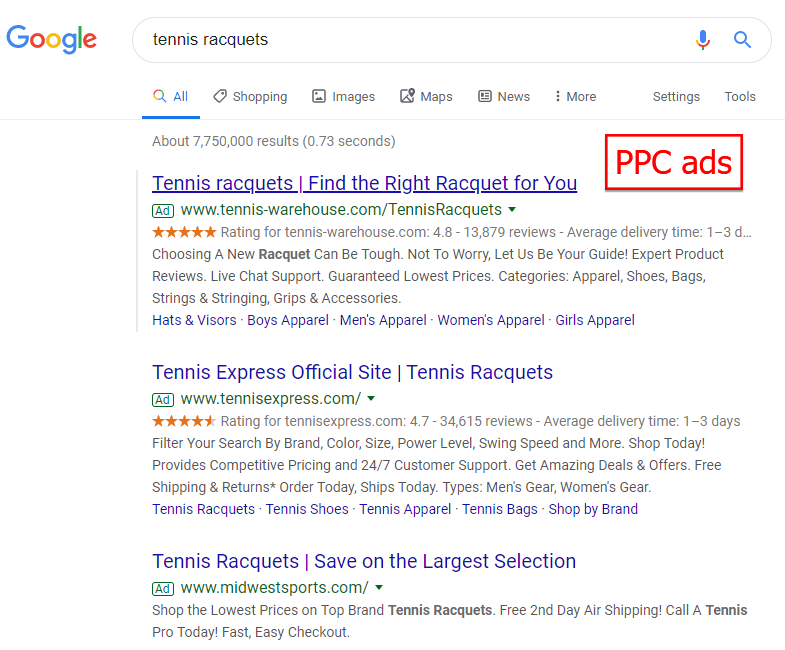 Your rankings with PPC are determined by how much you bid on keywords, the quality score of your ads, and the landing pages that the ads point to.
Your rankings with PPC are determined by how much you bid on keywords, the quality score of your ads, and the landing pages that the ads point to.
The main factor in deciding between the two is the kind of budget you have to work with.
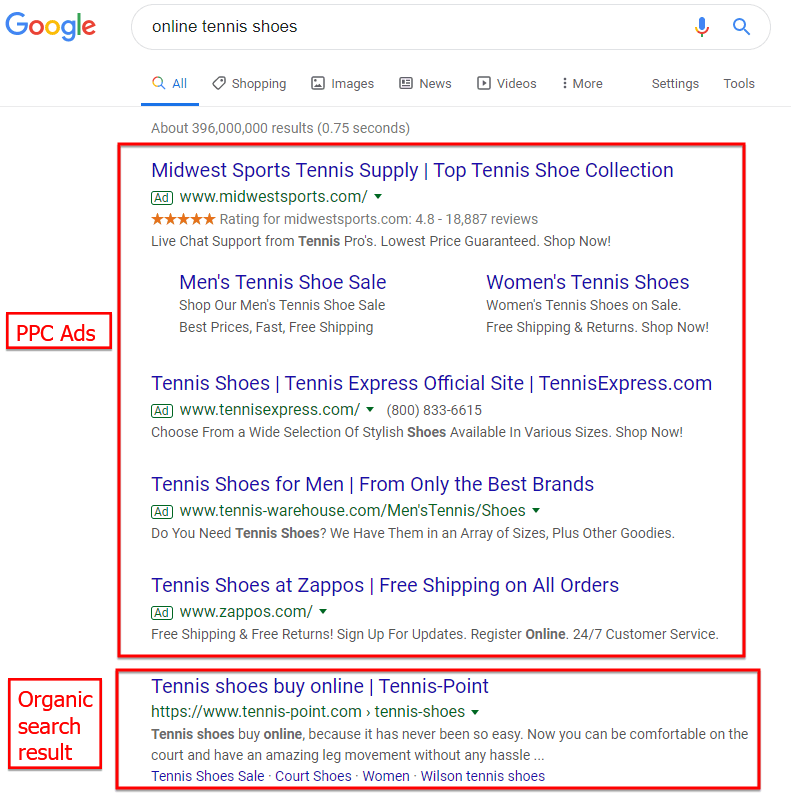
PPC pros
The advantages of using PPC include:
PPC offers maximum visibility in search results
On most search engines, PPC allows your business to rank above the regular search results so users will see your brand before your competitors. You can make sure this happens by bidding competitively on keywords that are valuable to your business.
To make PPC cost-effective, you can get higher placement and pay less for bids with a strong quality score. A strong quality score means that a high percentage of people who see your ad click on it and then stay on your page.
That tells the search engine that you’re supplying quality information that’s helping your visitors, and search engines want to keep recommending you.
So if you use PPC to provide relevant information to people interested in your business, you’ll gradually pay less and less to achieve the same rankings. That’s the power of a quality score.
PPC delivers immediate results
If you are first launching a website or even a brand new company, you want to get your new site/name out there as soon as possible. PPC works a lot faster in the short race of SEO vs. PPC, but faster doesn’t always mean long term. This is also beneficial if you have special promotions or events that need exposure and cannot be planned months in advance.
PPC offers complete control
With PPC ads, you have control over which page the “clicker” is sent to. By having control over the landing page, you are able to make sure that the visitor is seeing the most relevant information to what your ad was displaying.
The ads that are displayed are written by you and you are able to test them to see which ad performs the best, which landing page is better for visitors, etc.
PPC provides flexibility
You have the ability to choose which keywords you want to bid higher on, how much you want to spend in a day, and even the ability to pause your campaign if you are running low on your budget. You are also able to set the placement of your ads and the location where you want your ad to be shown.
PPC cons
The disadvantages of using PPC include:
PPC requires a constant investment
Once the money stops, the ads stop. While you may gain some branded traffic down the road, that unbranded search traffic will completely disappear when the ads stop running.
It also takes a long time to build a decent quality score, which means you’ll pay a lot more when you’re starting out and continue to pay a lot for months to come.
So even though PPC can affordable, it’s possible that you won’t have the budget for it — especially if you’re a startup or small business. Essentially, you’re paying money to make sure your company is found online, which can take its toll on your marketing budget if you’re not careful.
PPC deters some users
PPC listings look like ads because of an ad tag and are purposely placed where they are. Many people dislike ads, refuse to click on them, or frankly just have no idea what they are and do not trust them.
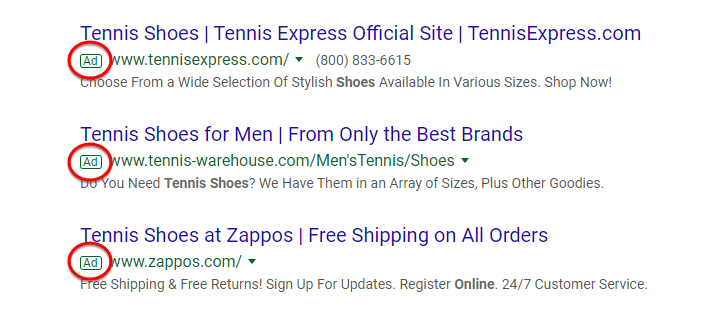
PPC costs add up
Even though you have the ability to control your PPC campaign budget, costs do begin to pile up and you may end up spending more money than you originally planned.  Traffic to your site with PPC is completely dependent on the money you pour into it. If the keywords you are targeting are highly competitive, they may be expensive and can drain your budget quickly.
Traffic to your site with PPC is completely dependent on the money you pour into it. If the keywords you are targeting are highly competitive, they may be expensive and can drain your budget quickly.
PPC comes with a learning curve
PPC is difficult for a lot of businesses to start because platforms like Google Ads are somewhat complicated.
It takes a lot of research and practice to nail down a practical PPC campaign for any business, especially when you’re brand new to it.
What is SEO?
SEO is the process of getting traffic from the “free” or “natural” listings on search engines, such as Google or Bing. SEO is like a marathon, where it takes a lot of time to see the results of your hard work. Your website is modified or improved to help it appear higher in the organic listings.
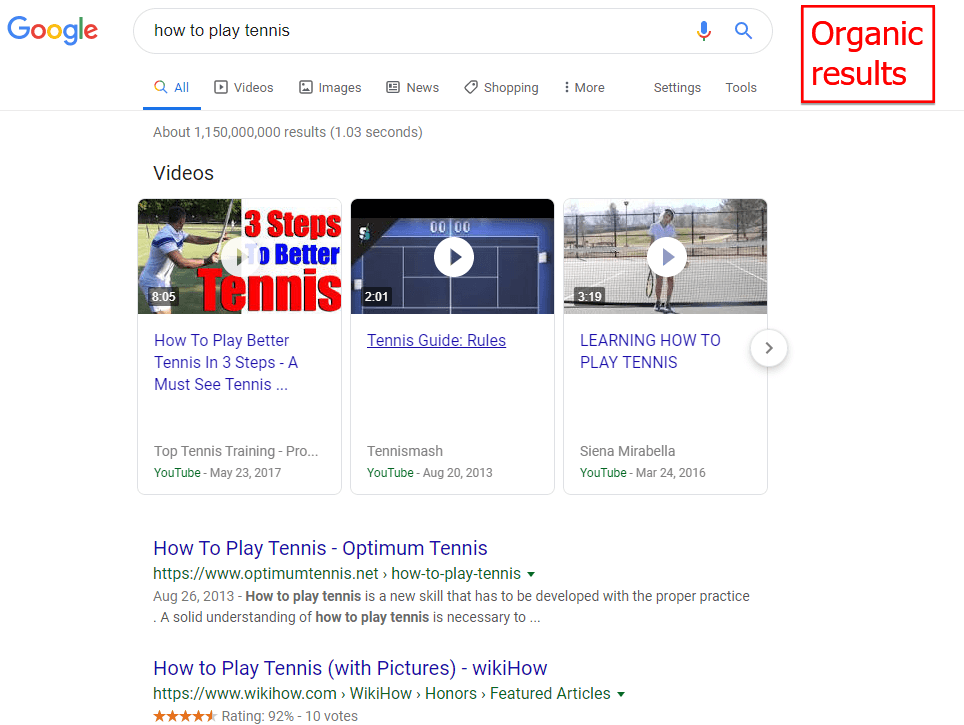 These listings or ranking positions are determined by factors such as the popularity of your links and the relevancy of your content, but changes definitely won’t happen overnight. All in all, there are roughly 200 SEO ranking factors that all influence how Google and other search engines rank your site in their search results.
These listings or ranking positions are determined by factors such as the popularity of your links and the relevancy of your content, but changes definitely won’t happen overnight. All in all, there are roughly 200 SEO ranking factors that all influence how Google and other search engines rank your site in their search results.
SEO pros
The advantages of using SEO include:
SEO is free
When you use SEO, your site will have a great opportunity to reach new customers without you contributing any funds directly to an advertising budget. The result is essentially free targeted advertising.
That means your customers actively search for you, as opposed to you searching for customers, and they can find you in search results on Google.
Then, you can take a few hours each day (or week) to create new pages for your site that focus on keywords that are valuable to your business. So if you own a pizzeria, you’d want to target a keyword like “best pizza in [your city]” to attract new customers. The more pages that you create, the more chances you have of engaging and attracting new customers so your business can grow.
SEO delivers long-term benefits
Once all the SEO best practices are implemented — like creating quality, keyword-rich content, and a strong linking profile — the results will outlast your efforts.
The return on investment for SEO will continue to climb long after PPC has peaked. That means your site will continue attracting customers indefinitely.
SEO drives relevant, targeted traffic
SEO allows for the use of long-tail keywords, which are three to five-word phrases that refine a search term to be more targeted. For example, someone who is searching for “wedding cakes” probably is just doing some casual browsing or looking for ideas.
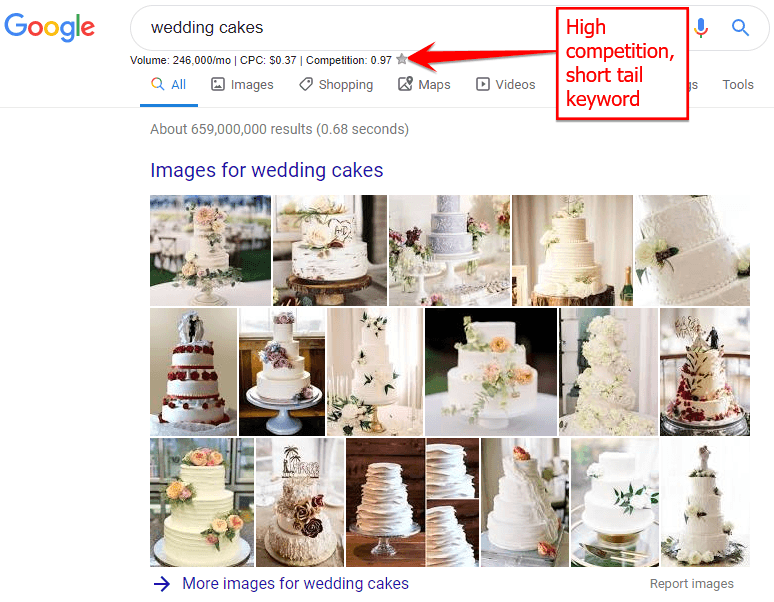 Someone who is searching for “wedding cake cost calculator” is someone who is further along in the buying process. With long-tail keywords comes more relevant traffic.
Someone who is searching for “wedding cake cost calculator” is someone who is further along in the buying process. With long-tail keywords comes more relevant traffic. 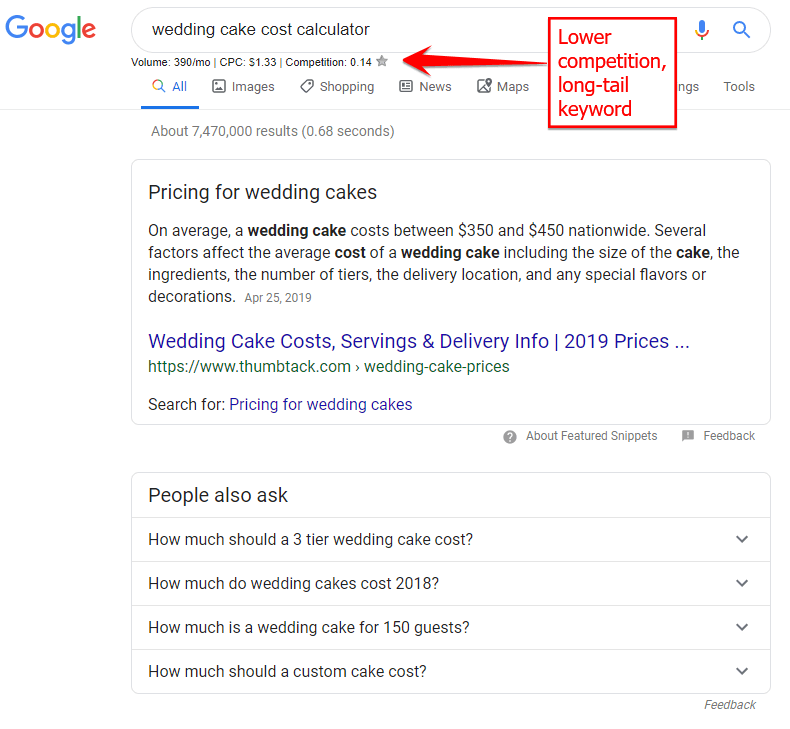
SEO encourages a user-friendly website
The main difference when it comes to SEO vs. PPC is that with PPC, you pay for the visitors, but with advanced SEO, you earn visitors by improving your site and following best practices. It may take a lot of work, but it’s a good thing in the long run because of the improvements to your site’s usability.
SEO cons
The disadvantages of using SEO include:
SEO faces ever-changing Google algorithms
A top complaint about SEO is that all of the work you put into your site to get your website on the first page results could be affected completely if Google releases new algorithm changes (which they do, at a rate of about 1.2 changes per day).
SEO requires ongoing maintenance
Keyword research, content updates, link building, and more are all factors of SEO that need to be regularly monitored and updated in order for your site to maintain rankings or to increase them.
SEO takes time
Compared to the instantaneous results of PPC, when you’re comparing SEO vs. PPC, the time lag with SEO can be a downfall. It can take anywhere from one to three months to see an increase in rankings or traffic. This also depends on how much optimization is needed for your site to even be ready to launch.
Not to mention, if you don’t want to pay an agency to do it, you have to tackle everything yourself.
That means months of work with little payoff. Even if you hire an agency, you’re still looking at a period of a few months before you see results. The amount of time it takes to rank well depends on the level of competition within your industry.
Get your digital advertising tips straight from the experts.
Read the Blog Post & Watch the Video

SEO vs. PPC: Which is better?
SEO and PPC both offer unique advantages and disadvantages. If you have to choose one, most marketers recommend SEO. Compared to PPC, SEO is more cost-effective.
That’s because SEO can generate long-term website traffic and revenue at a more cost-effective rate than PPC.
Why you should use SEO and PPC together
If you have the capabilities and budget, SEO and PPC work best when they’re used together. SEO is best for long-term goals and targeting specific, low-competition keywords that’ll continue to return results until you delete your site. PPC is great for short-term goals and targeting high-competition keywords that are too saturated to work in your SEO strategy.
Basically, when you use them together, you get the strengths of both with minimal downsides. It still takes time to implement an SEO strategy, and it still takes money to run PPC ads. But the combined revenue of both will offset any negative qualities — and then some.
SEO vs. PPC: Make your digital marketing decision
So should you start running that marathon or lace up the sneakers and begin the sprint? That question is up to you to decide. Both types of digital marketing need to be considered, then from there, you can determine whether SEO, PPC, or even both options are the best fit for your needs, goals, and budget.
If you’re ready to start driving results with SEO, PPC, or both SEO and PPC, WebFX provides expert SEO services and PPC services to clients across the country?
Whether you need SEO services in Orlando or PPC services in Philadelphia, we’ve got you covered.
-
 Jessica is a Google Analytics certified Digital Video Analyst at WebFX. She has created over 100 videos for the WebFX YouTube channel (youtube.com/webfx) in the last two years. Jessica specializes in video marketing and also loves content marketing, SEO, social media marketing, and many other aspects of digital marketing. When she’s not creating videos, Jessica enjoys listening to music, reading, writing, and watching movies.
Jessica is a Google Analytics certified Digital Video Analyst at WebFX. She has created over 100 videos for the WebFX YouTube channel (youtube.com/webfx) in the last two years. Jessica specializes in video marketing and also loves content marketing, SEO, social media marketing, and many other aspects of digital marketing. When she’s not creating videos, Jessica enjoys listening to music, reading, writing, and watching movies. -

WebFX is a full-service marketing agency with 1,100+ client reviews and a 4.9-star rating on Clutch! Find out how our expert team and revenue-accelerating tech can drive results for you! Learn more
Try our free SEO Checker
Boost your site’s search performance with our free SEO Checker. Analyze your website for optimization tips on titles, headers, content, speed, and more. Get a free report now to enhance rankings on Google, Bing, Yahoo, and beyond!
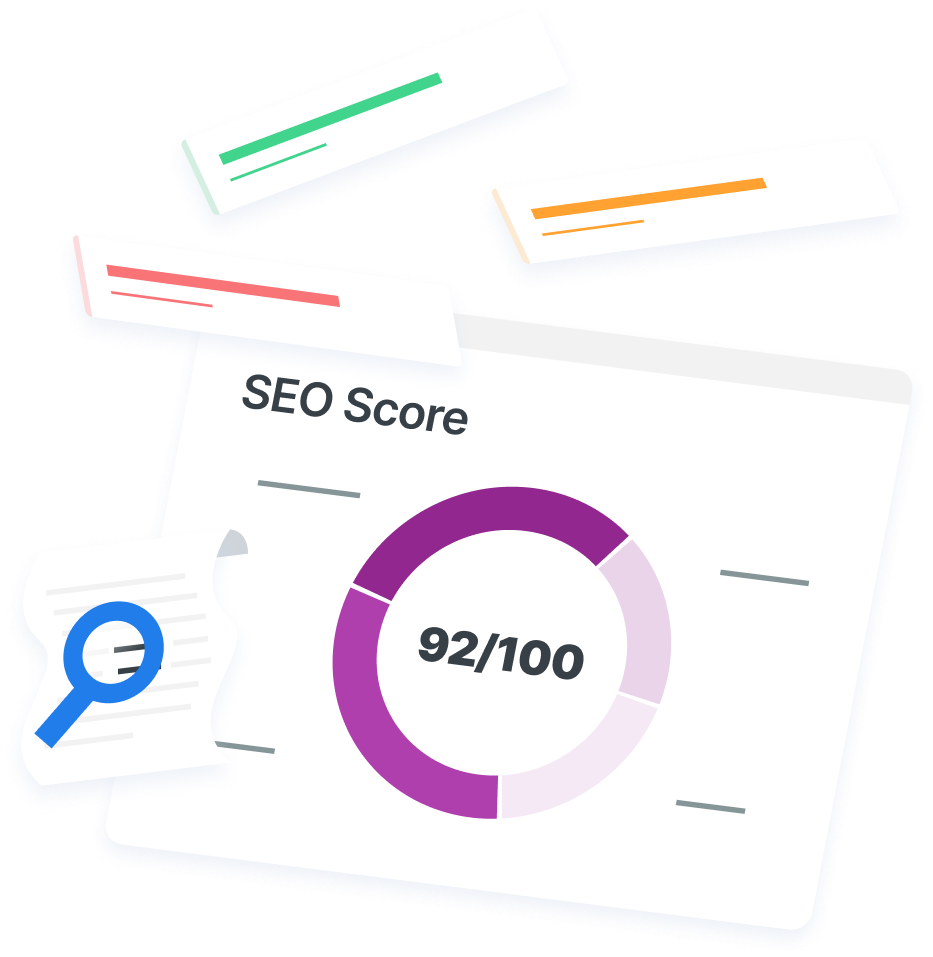

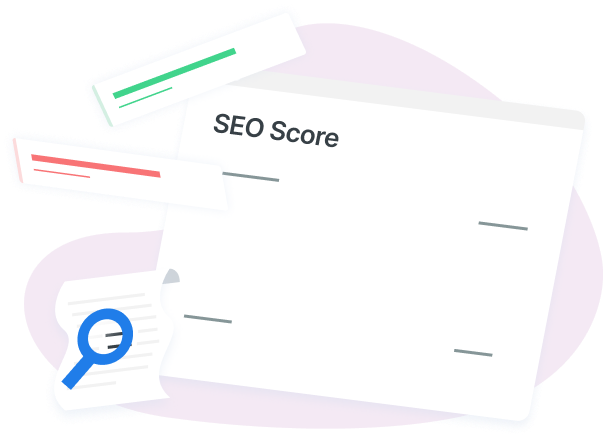
How Is Your Website’s SEO?
Use our free tool to get your score calculated in under 60 seconds.
Try our free SEO Checker
Boost your site’s search performance with our free SEO Checker. Analyze your website for optimization tips on titles, headers, content, speed, and more. Get a free report now to enhance rankings on Google, Bing, Yahoo, and beyond!






